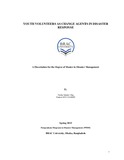| dc.contributor.advisor | Huq, Dr. Hamidul | |
| dc.contributor.author | Haq, Tushar Quader | |
| dc.date.accessioned | 2015-11-26T06:47:08Z | |
| dc.date.available | 2015-11-26T06:47:08Z | |
| dc.date.copyright | 2015 | |
| dc.date.issued | 2015 | |
| dc.identifier.other | ID 14168005 | |
| dc.identifier.uri | http://hdl.handle.net/10361/4651 | |
| dc.description | This dissertation is submitted in partial fulfillment of the requirements for the degree of Master in Disaster Management, 2015. | en_US |
| dc.description | Cataloged from PDF version of Dissertation. | |
| dc.description | Includes bibliographical references (page 64-69). | |
| dc.description.abstract | When disaster strikes the local youth are the first ones to respond. Volunteerism has been present since the beginning of human history. The youth constitute one third of total population in Bangladesh. For this important portion of population, determination of national outlook is undeniable. This study looks into the work of BDRCS youth volunteers as case of youth volunteers in disaster management. The purpose is to find the major factors that enable them to perform best as well as the barriers that hinder their work. The study used primary data through group interviews with BDRCS volunteers in Dhaka city and Manikganj district and key informant interviews and one case story. Findings from the study shows most youth joined in the volunteer program on their own. They prefer search and rescue work and are proud to be BDRCS volunteers. They are concerned about personal safety, quality and appropriate training, coordination, wrong attitude, gender inequality and media coverage. People engaging in similar acts may have different underlying motivations for doing so. Findings from the study shows that mostly, the BDRCS volunteers are motivated based on their values which are welfare of others or unselfishness. Other underlying motives includeopportunity to learn, career prospects, social pressure, to reduce feelings of guilt and enhance one‘s self-esteem. Activities for taking forward their work includes ensuring quality and appropriate training and appropriate gears and tools for search and rescue work, awareness raising, recognition and visibility of their work. Psychosocial counseling is important after rescue operations, as it is important to heal the psychological wounds after an emergency or a critical event. The study suggests involving volunteers in all stages of disaster management planning process. It is a matter of combined responsibility that volunteers are recognized for the contributions and their needs are ensured for them to accomplish their efforts successfully. | en_US |
| dc.description.statementofresponsibility | Tushar Quader Haq | |
| dc.format.extent | 74 pages | |
| dc.language.iso | en | en_US |
| dc.publisher | BRAC University | en_US |
| dc.rights | BRAC University dissertation are protected by copyright. They may be viewed from this source for any purpose, but reproduction or distribution in any format is prohibited without written permission | |
| dc.subject | Architecture | en_US |
| dc.subject | Youth volunteers | en_US |
| dc.title | Youth volunteers as change agents in disaster response | en_US |
| dc.type | Thesis | en_US |
| dc.contributor.department | Department of Architecture, BRAC University | |
| dc.description.degree | M. Disaster Management | |

